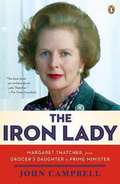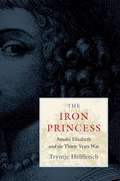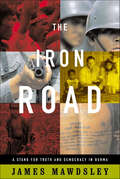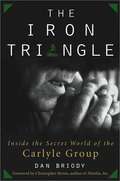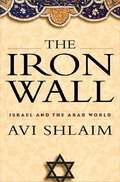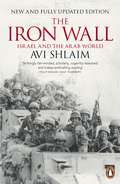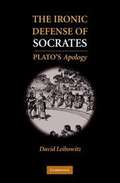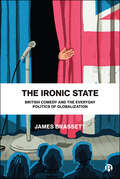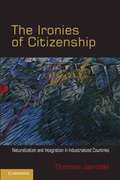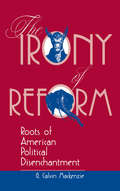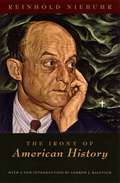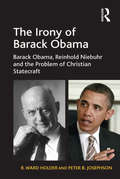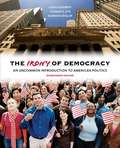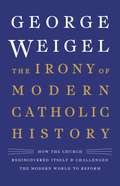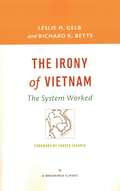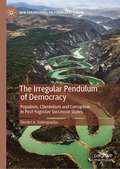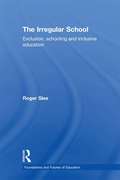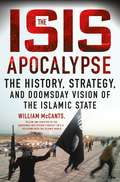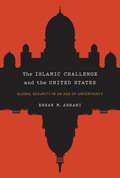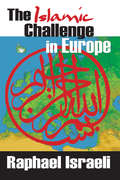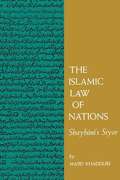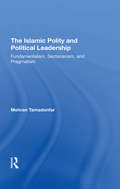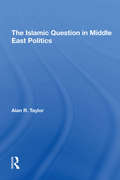- Table View
- List View
The Iron Lady
by John CampbellThe first full study of the Thatcher Government from beginning to dramatic end -- The Iron Lady is certain to become one of the greatest political biographies of our times. Frank Johnson in the Daily Telegraph described the first volume of John Campbell’s biography of Margaret Thatcher as “much the best book yet written about Lady Thatcher. ” That volume, The Grocer’s Daughter, described Mrs. Thatcher’s childhood and early career up until the 1979 General Election, which carried her into Downing Street. This second volume covers the whole eleven and a half years of her momentous premiership. Thirteen years after her removal from power, this is the first comprehensive and fully researched study of the Thatcher government from its hesitant beginning to its dramatic end. Campbell draws on the mass of memoirs and diaries of Margaret Thatcher’s colleagues, aides, advisers and rivals, as well as on original material from the Ronald Reagan archive, shedding fascinating new light on the Reagan-Thatcher “special relationship,” and on dozens of interviews. The Iron Lady will confirm John Campbell’s Margaret Thatcher as one of the greatest political biographies of recent times.
The Iron Princess
by Tryntje HelfferichThrust into power in the midst of the bloodiest conflict Europe had ever experienced, Amalia Elisabeth fought to save her country, her Calvinist church, and her children’s inheritance. Tryntje Helfferich’s vivid portrait reveals how this unique and embattled ruler used her diplomatic gifts to play the great powers of Europe against one another during the Thirty Years War, while raising one of the most powerful and effective fighting forces on the continent. Stranded in exile after the death of her husband, Amalia Elisabeth stymied the maneuvers of male relatives and advisors who hoped to seize control of the affairs of her tiny German state of Hesse-Cassel. Unshakable in her religious faith and confident in her own capacity to rule, the princess crafted a cunning strategy to protect her interests. Despite great personal tragedy, challenges to her rule, and devastating losses to her people and lands, Amalia Elisabeth wielded her hard-won influence to help shape the new Europe that arose in the war’s wake. She ended her reign in triumph, having secured the birthright of her children and the legalization of her church. The Iron Princess restores to view one of the most compelling political figures of her time, a woman once widely considered the heroine of the seventeenth century.
The Iron Road: A Stand for Truth and Democracy in Burma
by James MawdsleyA startling account of an evil regime and one young man's efforts to defy it.Twenty-eight-year-old James Mawdsley spent much of the past four years in grim Burmese prisons. The Iron Road is his story, and the story of the regime that jailed him, the way it jails, tortures, and kills hundreds of Burmese each day.Mawdsley was working in New Zealand when he learned about the struggle of Daw Aung San Suu Kyi, the Burmese Nobel laureate who is under house arrest. Outraged, he went to Burma, staged a one-man protest, and was jailed. There his own amazing story begins. He is tortured, interrogated, released, jailed again. He turns his incarceration into a contest of wits -- going on a hunger strike, toasting the year 2000 with a cigar and "prison champagne," and requesting "1 packet of freedom, 1 bunch human rights, and 2 bottles of democracy." At the same time, he asks himself: What leads those of us in peaceful democracies to ignore others' suffering, just because it is happening "over there," to "them"? James Mawdsley is a hero in a generation said to lack heroism. The Iron Road -- named for a torture in which skin is scraped from bone with a piece of iron -- is an urgent call for an end to human rights abuses in Burma and is a keen analysis of the totalitarian mind-set. And it is the story, at once moving and terrifying, of how one person can further the cause of justice through sheer will and determination.
The Iron Triangle: Inside the Secret World of the Carlyle Group
by Dan BriodyDwight D. Eisenhower, upon leaving the office of president in 1961, warned future generations against the dangers of a "militaryindustrial complex," and the "grave implications" of the "conjunction of an immense military establishment and a large arms industry." The wisdom of these comments has clearly been lost in the forty years since Ike left office. And the first step towards turning things around is understanding how we got here. No single company can illustrate that progression better than the Carlyle Group, a business founded on a tax scheme in 1987 that has grown up to be what its own marketing literature once called "a vast interlocking global network." The company does business at the confluence of the war on terrorism and corporate responsibility. It is a world that few of us can even imagine, full of clandestine meetings, quid pro quo deals, bitter ironies, and petty jealousies. And the cast of characters includes some of the most famous and powerful men in the world. This is today's America. This is the Carlyle Group.
The Iron Wall: Israel and the Arab World
by Avi ShlaimIn 1897, under order of First Zionist Congress president Theodor Herzl, two Austrian rabbis traveled to Palestine to explore the possibility of locating a Jewish state there. "The bride is beautiful," the rabbis cabled Herzl, "but she is married to another man." That "other man" was the Palestinian Arab nation, long established in the region as a political entity. Undeterred, Herzl pressed on with his program of emigration, ignoring Palestine's existing occupants and creating in the process what came to be known as the "Arab question." In this far-ranging history, Avi Shlaim analyzes that question in remarkable detail, tracing the shifting policies of Israel toward the Palestinians and the Arab world at large. Herzl, he writes, followed a policy that consciously sought to enlist the great powers--principally Britain and later the United States--while dismissing indigenous claims to sovereignty; after all, Herzl argued, "the Arab problem paled in significance compared with the Jewish problem because the Arabs had vast spaces outside Palestine, whereas for the Jews, who were being persecuted in Europe, Palestine constituted the only possible haven." This policy later changed to a stance of confrontation against the admittedly hostile surrounding Arab powers, especially Syria, Jordan, and Egypt; this militant stance was a source of controversy in the international community, and it also divided Israelis into hawk and dove factions. The intransigence of those hawks, Shlaim shows, served to alienate Israel and made it possible for the Palestine Liberation Organization and other Arab nationalist groups to enlist the support of the great powers that Herzl had long before courted. Both sides, in turn, had eventually to face the "historic compromise" that led to the present peace in the Middle East--a peace that, the author suggests, may not endure. There is no question that Shlaim presents compelling evidence for a revaluation of traditional Israeli history. A great deal has been learned in the past 15 years because of researchers like him.
The Iron Wall: Israel and the Arab World
by Avi ShlaimAvi Shlaim's The Iron Wall: Israel and the Arab World is the outstanding book on Israeli foreign policy, now thoroughly updated with a new preface and chapters on Israel's most recent leadersIn the 1920s, hard-line Zionists developed the doctrine of the 'Iron Wall': negotiations with the Arabs must always be from a position of military strength, and only when sufficiently strong Israel would be able to make peace with her Arab neighbours.This doctrine, argues Avi Shlaim, became central to Israeli policy; dissenters were marginalized and many opportunities to reconcile with Palestinian Arabs were lost. Drawing on a great deal of new material and interviews with many key participants, Shlaim places Israel's political and military actions under and uncompromising lens.His analysis will bring scant comfort to partisans on both sides, but it will be required reading for anyone interested in this fascinating and troubled region of the world.'The Iron Wall is strikingly fair-minded, scholarly, cogently reasoned and makes enthralling ... reading' Philip Ziegler, Daily Telegraph'Anyone wanting to understand the modern Middle East should start by reading this elegantly written and scrupulously researched book' Trevor Royle, Sunday Herald'A milestone in modern scholarship of the Middle East' Edward Said'Fascinating ... Shlaim presents compelling evidence for a revaluation of traditional Israeli history' Ethan Bronner, The New York Times Book ReviewAvi Shlaim is Professor of International Relations at St. Antony's College, Oxford. His previous books include Collusion Across the Jordan (1988) and War and Peace in the Middle East (1995).
The Ironic Defense of Socrates
by David LeibowitzThis book offers a controversial new interpretation of Plato's Apology of Socrates. By paying unusually close attention to what Socrates indicates about the meaning and extent of his irony, David Leibowitz arrives at unconventional conclusions about Socrates' teaching on virtue, politics, and the gods; the significance of his famous turn from natural philosophy to political philosophy; and the purpose of his insolent "defense speech. " Leibowitz shows that Socrates is not just a colorful and quirky figure from the distant past but an unrivaled guide to the good life - the thoughtful life - who is as relevant today as in ancient Athens. On the basis of his unconventional understanding of the dialogue as a whole, and of the Delphic oracle story in particular, Leibowitz also attempts to show that the Apology is the key to the Platonic corpus, indicating how many of the disparate themes and apparently contradictory conclusions of the other dialogues fit together.
The Ironic State: British Comedy and the Everyday Politics of Globalization
by James BrassettWhat can comedy tell us about the politics of a nation? In this book, James Brassett builds on his prize-winning research to demonstrate how British comedy can provide intimate and vital understandings of the everyday politics of globalization in Britain. The book explores British comedy and Britain’s global politics from post-war imperial decline through to its awkward embrace of globalization, examining a wide variety of comedic mediums, such as the popular television show The Office and the online satire The Daily Mash. Touching on issues such as empire, the class system and capitalism, the author demonstrates how comedy offers valuable insights on how global market life is experienced, mediated, contested and accommodated.
The Ironies of Citizenship
by Thomas JanoskiExplanations of naturalization and jus soli citizenship have relied on cultural, convergence, racialization, or capture theories, and they tend to be strongly affected by the literature on immigration. This study of naturalization breaks with the usual immigration theories and proposes an approach over centuries and decades toward explaining naturalization rates. First, it provides consistent evidence to support the long-term existence of colonizer, settler, non-colonizer, and Nordic nationality regime types that frame naturalization over centuries. Second it shows how left and green parties, along with an index of nationality laws, explain the lion's share of variation in naturalization rates. The text makes these theoretical claims believable by using the most extensive data set to date on naturalization rates that include jus soli births. It analyzes this data with a combination of carefully designed case studies comparing two to four countries within and between regime types.
The Ironies of Colonial Governance: Law, Custom and Justice in Colonial India (Cambridge Studies in Law and Society)
by James JaffeThe Indian village council, or panchayat, has long held an iconic place in India. Ironies of Colonial Governance traces the history of that ideal and the attempts to adapt it to colonial governance. Beginning with an in-depth analysis of British attempts to introduce a system of panchayat governance during the early nineteenth century, it analyses the legacies of these actions within the structures of later colonial administrations as well as the early nationalist movement. Particular attention is paid to the ways in which the ideologies of panchayat governance evolved during this period and to the transnational exchange and circulation of panchayat ideologies. Analyses colonial law within a transnational perspective, thereby providing a comparative imperial perspective on the evolution of law and justice. Combines the history of ideas and the history of colonial administration in order to illustrate the imperial circulation of ideas and trace the ideological sources of colonial law and administration. Focuses on the ideological and practical changes in the perceptions of customary law, customary courts and local administration within India, making this of interest to those seeking to understand how ideas affect practice in colonial administration as well as how practice affected ideology.
The Irony Of Reform: Roots Of American Political Disenchantment (Transforming American Politics Ser.)
by G. Calvin MackenzieAmericans are disenchanted with politics, their government, and their leaders. But before Americans climb again on a new bandwagon of government restructuring, they would do well to listen to Cal Mackenzies admonitions in The Irony of Reform. The trouble with contemporary government, he explains, is not a lack of change or restructuring over the years, but rather the disjointed, inadvertent, and unpredictable pattern of reform we have followed since World War II. Mackenzie traces the roots of our current distress, noting that more tinkering will only lead to morethough perhaps differentproblems. Something much bolder is neededa new approach that enables leadership, facilitates coalition building, and enhances accountability. }Americans are disenchanted with politics, their government, and their leaders. For evidence, we dont have to look very far: the elections of 1994 turned over control of Congress for the first time in 40 years, and the new House Republicans Contract with America was the biggest single anti-government initiative since the Boston Tea Party, with term limits, campaign finance reform, and a balanced budget amendment high on its list of priorities. But before Americans climb again on a new bandwagon of government restructuring, they would do well to listen to Cal Mackenzies admonitions in The Irony of Reform. The trouble with contemporary government, he explains, is not a lack of change or restructuring over the years, but rather the disjointed, inadvertent, and unpredictable pattern of reform we have followed since World War II.Mackenzie traces the roots of our current distress, noting that more tinkering will only lead to morethough perhaps differentproblems. Something much bolder is neededa new approach that enables leadership, facilitates coalition building, and enhances accountability. Mackenzie proposes a cure for the political ills diagnosed herea hard and painful cure for a very crippled body politic.
The Irony of American History: Leaves From The Notebook Of A Tamed Cynic / Moral Man And Immoral Society / The Children Of Light And The Children Of Darkness / The Irony Of American History
by Reinhold Niebuhr“[Niebuhr] is one of my favorite philosophers. I take away [from his works] the compelling idea that there’s serious evil in the world, and hardship and pain. And we should be humble and modest in our belief we can eliminate those things. But we shouldn’t use that as an excuse for cynicism and inaction. I take away . . . the sense we have to make these efforts knowing they are hard.”—President Barack Obama Forged during the tumultuous but triumphant postwar years when America came of age as a world power, The Irony of American History is more relevant now than ever before. Cited by politicians as diverse as Hillary Clinton and John McCain, Niebuhr’s masterpiece on the incongruity between personal ideals and political reality is both an indictment of American moral complacency and a warning against the arrogance of virtue. Impassioned, eloquent, and deeply perceptive, Niebuhr’s wisdom will cause readers to rethink their assumptions about right and wrong, war and peace. “The supreme American theologian of the twentieth century.”—Arthur Schlesinger Jr., New York Times “Niebuhr is important for the left today precisely because he warned about America’s tendency—including the left’s tendency—to do bad things in the name of idealism. His thought offers a much better understanding of where the Bush administration went wrong in Iraq.”—Kevin Mattson, The Good Society “Irony provides the master key to understanding the myths and delusions that underpin American statecraft. . . . The most important book ever written on US foreign policy.”—Andrew J. Bacevich, from the Introduction
The Irony of Barack Obama: Barack Obama, Reinhold Niebuhr and the Problem of Christian Statecraft
by R. Ward Holder Peter B. JosephsonDrawing on the political theology of Reinhold Niebuhr, described by Barack Obama as 'one of my favourite philosophers', this book assesses the challenges facing the President during his first term. It evaluates his success in adhering to Niebuhr's path of 'Christian realism' when faced with the pragmatic demands of domestic and foreign affairs. In 2008 Candidate Obama used the ideas of 'Hope' and 'Change' to inspire voters and secure the presidency. Obama promised change not only regarding America's policies, but even more fundamentally in the nation's political culture. Holder and Josephson describe the foundations of President Obama's Christian faith and the extent to which it has shaped his approach to politics. Their book explores Obama's journey of faith in the context of a broadly Augustinian understanding of faith and politics, examines the tensions between Christian realism and pragmatic progressivism, explains why a Christian realist interpretation is essential to understanding Obama's presidency, and applies this model of understanding to considerations of foreign and domestic policy. By combining this theological and political analysis the book offers a special opportunity to reflect on the relationship between Christian faith and statesmanship, reflections that are missing from current popular discussions of the Obama presidency. Through consideration of Niebuhr's models of the prophet and the statesman, and the more popular alternative of the political evangelist, Holder and Josephson are better able to explain the president's successes and his failures, and to unveil the Augustinian limits of the political life.
The Irony of Democracy: An Uncommon Introduction to American Politics
by Thomas R. Dye Louis Schubert Harmon ZeiglerThe question at the center of the seventeenth edition of THE IRONY OF DEMOCRACY is "How democratic is American society?" While most American government books address politics from a pluralist perspective (the theory that many groups of people share power in the United States), this book approaches the subject using an elitist perspective (the theory that only a tiny number of people make the decisions that shape our lives). By exposing the irony between elitism and democratic theory and modern pluralism, this eye-opening book helps readers understand why the U. S. government works as it does.
The Irony of Modern Catholic History: How the Church Rediscovered Itself and Challenged the Modern World to Reform
by George WeigelA powerful new interpretation of Catholicism's dramatic encounter with modernity, by one of America's leading intellectualsThroughout much of the nineteenth century, both secular and Catholic leaders assumed that the Church and the modern world were locked in a battle to the death. The triumph of modernity would not only finish the Church as a consequential player in world history; it would also lead to the death of religious conviction. But today, the Catholic Church is far more vital and consequential than it was 150 years ago. Ironically, in confronting modernity, the Catholic Church rediscovered its evangelical essence. In the process, Catholicism developed intellectual tools capable of rescuing the imperiled modern project. A richly rendered, deeply learned, and powerfully argued account of two centuries of profound change in the church and the world, The Irony of Modern Catholic History reveals how Catholicism offers twenty-first century essential truths for our survival and flourishing.
The Irony of Vietnam: The System Worked
by Fareed Zakaria Leslie H. Gelb Richard K. Betts"If a historian were allowed but one book on the American involvement in Vietnam, this would be it." - Foreign Affairs When first published in 1979, four years after the end of one of the most divisive conflicts in the United States, The Irony of Vietnam raised eyebrows. Most students of the war argued that the United States had "stumbled into a quagmire in Vietnam through hubris and miscalculation," as the New York Times's Fox Butterfield put it. But the perspective of time and the opening of documentary sources, including the Pentagon Papers, had allowed Gelb and Betts to probe deep into the decisionmaking leading to escalation of military action in Vietnam. The failure of Vietnam could be laid at the door of American foreign policy, they said, but the decisions that led to the failure were made by presidents aware of the risks, clear about their aims, knowledgeable about the weaknesses of their allies, and under no illusion about the outcome.The book offers a picture of a steely resolve in government circles that, while useful in creating consensus, did not allow for alternative perspectives. In the years since its publication, The Irony of Vietnam has come to be considered the seminal work on the Vietnam War.
The Irregular Pendulum of Democracy: Populism, Clientelism and Corruption in Post-Yugoslav Successor States (New Perspectives on South-East Europe)
by Dimitri A. SotiropoulosThis book argues that the backsliding or stagnation of democracy should be interpreted in a wider perspective on irregular movements towards and away from contemporary liberal democracy. This a perspective couched by a metaphor, namely the 'pendulum of democracy', which the author has constructed to suggest that democratic regimes may swing between a democratic end (fully developed liberal democracy) and a semi-authoritarian end (competitive authoritarianism). The pendulum does not have a predictable frequency. Democratization may lead to irregular movements back and forth. It is easier to analyze such movements of the pendulum when democracy is not consolidated yet (for instance, in the three post-Yugoslav political regimes mentioned above), as democratic institutions and processes are not yet stable. For this reason, this book analyses the swing of unconsolidated democracy away from the democratic end in the cases of today’s Serbia and Montenegro and the swing back towards liberal democracy in the case of North Macedonia which - until 2017 - had been developing into a competitive authoritarian regime, but then embarked on the road to democratic recovery.
The Irregular School: Exclusion, Schooling and Inclusive Education (Foundations and Futures of Education)
by Roger SleeShould disabled students be in regular classrooms all of the time or some of the time? Is the regular school or the special school or both the solution for educating students with a wide range of differences? Inclusive education has been incorporated in government education policy around the world. Key international organisations such as UNESCO and OECD declare their commitment to Education for All and the principles and practice of inclusive education. There is no doubt that despite this respectability inclusive education is hotly contested and generates intense debate amongst teachers, parents, researchers and policy-makers. People continue to argue over the nature and extent of inclusion. The Irregular School explores the foundations of the current controversies and argues that continuing to think in terms of the regular school or the special school obstructs progress towards inclusive education. The book contends that we need to build a better understanding of exclusion, of the foundations of the division between special and regular education, and of school reform as a precondition for more inclusive schooling in the future. Schooling ought to be an apprenticeship in democracy and inclusion is a prerequisite of a democratic education. The Irregular School builds on existing research and literature to argue for a comprehensive understanding of exclusion, a more innovative and aggressive conception of inclusive education and a genuine commitment to school reform that steps aside from the troubled and troubling notions of regular schools and special schools. It will be of interest to all those working and researching in the field of inclusive education.
The Isis Apocalypse: The History, Strategy, and Doomsday Vision of the Islamic State
by William MccantsThe Islamic State is one of the most lethal and successful jihadist groups in modern history, surpassing even al-Qaeda. Thousands of its followers have marched across Syria and Iraq, subjugating millions, enslaving women, beheading captives, and daring anyone to stop them. Thousands more have spread terror beyond the Middle East under the Islamic State's black flag. How did the Islamic State attract so many followers and conquer so much land? By being more ruthless, more apocalyptic, and more devoted to state-building than its competitors. The shrewd leaders of the Islamic State combined two of the most powerful yet contradictory ideas in Islam-the return of the Islamic Empire and the end of the world-into a mission and a message that shapes its strategy and inspires its army of zealous fighters. They have defied conventional thinking about how to wage wars and win recruits. Even if the Islamic State is defeated, jihadist terrorism will never be the same. Based almost entirely on primary sources in Arabic-including ancient religious texts and secret al-Qaeda and Islamic State letters that few have seen - William McCants' The ISIS Apocalypse explores how religious fervor, strategic calculation, and doomsday prophecy shaped the Islamic State's past and foreshadow its dark future.
The Islamic Challenge and the United States: Global Security in an Age of Uncertainty
by Ehsan M. AhrariOn September 11, 2001, Osama bin Laden declared "global jihad" on the West. In response to the day's attacks, the United States has waged its own global war on terrorism, which the Pentagon has described as a generational conflict similar to the Cold War. In The Islamic Challenge and the United States, Ehsan Ahrari takes a close look at this ideological conflict, focusing on the Middle East, Africa, and South and Central Asia. Arguing that the war on terrorism is founded on secular fundamentalism (an ideology that envisions Islam as dangerous and volatile because it mixes religion and politics) and the Enlightenment narrative, Ahrari suggests that the United States sees global jihadists as absolutist, irrational, obscurantist, and anti-modern. While violence on behalf of the Muslim community – ummah – is thus framed as reprehensible, violence on behalf of the Western nation-state is seen as sometimes necessary and often praiseworthy. Unsettlingly, this framework does not encourage careful scrutiny of America's historical dealings with the Muslim world. The belief that religion causes violence, Ahrari argues, may blind the West to its own forms of fanaticism. A timely analysis of one of the most contested issues of our times, The Islamic Challenge and the United States is a must-read for global security practitioners, policymakers, and general readers.
The Islamic Challenge and the United States: Global Security in an Age of Uncertainty
by Ehsan M. AhrariOn September 11, 2001, Osama bin Laden declared "global jihad" on the West. In response to the day's attacks, the United States has waged its own global war on terrorism, which the Pentagon has described as a generational conflict similar to the Cold War. In The Islamic Challenge and the United States, Ehsan Ahrari takes a close look at this ideological conflict, focusing on the Middle East, Africa, and South and Central Asia. Arguing that the war on terrorism is founded on secular fundamentalism (an ideology that envisions Islam as dangerous and volatile because it mixes religion and politics) and the Enlightenment narrative, Ahrari suggests that the United States sees global jihadists as absolutist, irrational, obscurantist, and anti-modern. While violence on behalf of the Muslim community – ummah – is thus framed as reprehensible, violence on behalf of the Western nation-state is seen as sometimes necessary and often praiseworthy. Unsettlingly, this framework does not encourage careful scrutiny of America's historical dealings with the Muslim world. The belief that religion causes violence, Ahrari argues, may blind the West to its own forms of fanaticism. A timely analysis of one of the most contested issues of our times, The Islamic Challenge and the United States is a must-read for global security practitioners, policymakers, and general readers.
The Islamic Challenge in Europe
by Raphael IsraeliSince the World Trade Center attacks in New York on September 11, 2001, Europe has been plagued by Islamist attacks that have taken many lives and disrupted many services. Considerable attention has been paid to radical Islamist attacks on the United Kingdom, France, and Germany, but far less focus has been on the Islamist extremist impact on the rest of Europe. This book warns all Europeans, but Middle Easterners as well, that they are not immune to terror. That terror is confined to Jews and Israel is a myth. Muslim extremist attacks have taken place against other Muslim nations--as well as European nations in which Jewish influence or Israeli support is negligible. The waves of Muslim recrimination against the West have given rise to internal struggles within the Arab world played out in terrorist acts. Muslim brotherhoods have defined a global war against other religions, nations, and cultures that stray from the principles of fundamentalism--a cultural and military jihad. Just where religious identity supervenes national identity has become a critical turning point. Israeli's book shows that the line between moderates and extremists within the Islamic fold is vague, ambiguous, and in certain situations non-existent. It draws attention to polls and public sentiments of the Islamic faithful, and emphasizes the Islamic attack on modernization and its cultural sources. This timely volume is addressed to those in the West who are not accustomed to thinking in apocalyptic terms. Israeli provides painstaking details of European responses to Islamist challenges, particularly those who prefer pragmatic compliance rather than response. He demonstrates that Islamic extremism continues to grow in the heartland of the European world. This is neither an optimistic nor pessimistic book; its disturbing message may be a wake-up call to some. It is a necessary read for those who want to go beyond news, opting for a more intellectual and comprehensive diet.
The Islamic Law of Nations: Shaybani's Siyar
by Majid Khadduri Muhammad ibn al-Hasan al-ShaybaniTranslated with an extensive commentary by Majid Khadduri, Shaybani's Siyar describes in detail conditions for war (jihad) and for peace, principles for the conduct of military action and of diplomacy, and rules for the treatment of non-Muslims in Muslim lands. A foundational text of the leading school of law in Sunni Islam, it provides essential insights into relations between Islamic nations and the larger world from their earliest days up to the present.
The Islamic Polity And Political Leadership: Fundamentalism, Sectarianism, And Pragmatism
by Mehran TamadonfarThis book is employed for the study of the Islamic polity and political leadership and examines the basic features of the Islamic polity. It provides a theoretical framework for the study of political authority in the Islamic world signifying individual leaders' characteristics.
The Islamic Question In Middle East Politics
by Alan R TaylorThis book provides an overview of the origins, development, and eventual encounters of secular nationalism and the various manifestations of the Islamic reform movement. The scope of the book is restricted to the Middle East (Turkey, Iran, and the Arab states).
